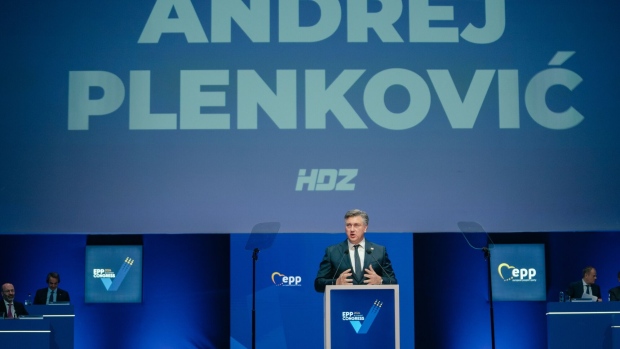Mar 15, 2024
Croatia to Vote in April as Ruling Party Touts Euro, Wage Hikes
, Bloomberg News

(Bloomberg) -- Croatia will hold a parliamentary election in April as Prime Minister Andrej Plenkovic seeks to secure a third term in power after he oversaw the Balkan nation’s adoption of the euro and accession to the European Union’s visa-free travel area.
President Zoran Milanovic announced the April 17 election on Friday, giving Croatians a holiday next month with the ballot falling on a Wednesday.
Croatia’s economy has been one of the fastest-growing in the EU in the last two years, benefiting from access to EU funds, the euro and entry into the visa-free Schengen area. The government forecasts economic growth of 2.8% this year.
Plenkovic’s conservative Croatian Democratic Union, or HDZ, which has dominated the country’s politics since it broke away from Yugoslavia over three decades ago, will seek to extend its hold on power.
The HDZ holds a lead in the polls, drawing about 27% support — almost 10 percentage points ahead of the main opposition Social Democrats, according to a March 10 Promocija Plus survey. The right-wing Homeland Movement and another center-right party, Bridge, polled in the single digits.
Plenkovic’s party has sought to shake off accusations of corruption among party officials — seven ministers left the cabinet during the premier’s first term. As the Social Democrats have focused on the issue, the HDZ has sought to capitalize on pension and wage hikes, led by increases in the public sector. The latest wage round for public employees will see a fresh pay rise in April.
“On one side it all boils down to economic achievements — and on the other to moral panic about corruption,” said Zarko Puhovski, a political science professor in Zagreb. “The opposition has no clear program and no leader with authority.”
“The HDZ will no doubt win a relative majority, but it will have to create a coalition to govern,” Puhovski said.
Plenkovic, a 53-year-old former diplomat and lawyer by training, has led the country since 2016, the country’s longest-ruling premier since independence in 1991. The HDZ governs in a coalition with several smaller parties and minority lawmakers, giving it a razor-thin majority in the 151-seat parliament.
©2024 Bloomberg L.P.








